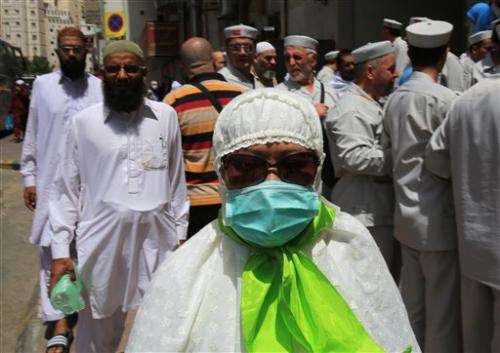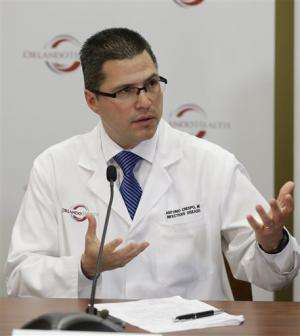WHO: MERS virus isn't an emergency—yet (Update)

The spread of a puzzling respiratory virus in the Middle East and beyond doesn't yet constitute a global health emergency despite a recent spike in cases, the World Health Organization said Wednesday.
The decision was made after a meeting of WHO's expert group on the Middle East respiratory syndrome, or MERS.
Since 2012, MERS has sickened more than 500 people and killed 145, mostly in the Middle East. The vast majority of cases have been in Saudi Arabia, although the disease has spread within the region and to Asia, North Africa, Europe and the United States.
MERS often starts with flu-like symptoms but can lead to pneumonia, breathing problems and in severe cases, kidney failure and death.
"Calling a global emergency in a world which has a lot of urgent issues going on is a major act," Dr. Keiji Fukuda, an assistant director-general of WHO, told reporters Wednesday. "You have to have really solid information to say this is a global emergency."
Fukuda said there wasn't yet proof of the virus' sustained transmission among people.
Last week WHO did declare the world's widening polio outbreaks to be an international health emergency.
Some scientists said while MERS technically meets the criteria for a global health emergency, declaring it as such could confuse the public.

"People might think (WHO) is crying wolf because MERS is still primarily a problem in the Middle East," said Michael Osterholm, an infectious diseases expert at the University of Minnesota who has worked in the Middle East. "But if one of those infected people gets on a plane and lands in London, Toronto, New York or Hong Kong and transmits to another 30 people, everyone will have a different view."
On Wednesday, the Netherlands' National Institute for Public Health and the Environment announced its first case of MERS, a man who became infected during a visit to Saudi Arabia. He is now in isolation at a hospital in The Hague. Saudi Arabia's health ministry also reported five more MERS deaths on Wednesday. In the past 24 hours, the kingdom has identified 16 new cases in Riyadh, Jiddah and Medina.
Some experts say the spread of MERS is worryingly similar to the 2003 global outbreak of Severe Acute Respiratory Syndrome or SARS, which infected about 8,000 people in 2003, killing nearly 800. MERS is genetically related to SARS.
Scientists are unsure exactly how people are catching MERS but suspect the disease is linked to camels. WHO recommends that people avoid contact with the animals, skip drinking camel milk or using camel urine in traditional medicines and only eat camel meat that has been well cooked.
Dr. Clemens Wendtner, who treated a German MERS patient in Munich last year, said the current spread of MERS should not set off a global alarm. He was not part of the WHO meeting.
"I do not see an international threat or a pandemic (being caused) by MERS," he wrote in an email. He said the spread of MERS to humans was still exceptional and that the disease was mostly affecting animals.
WHO said its expert committee would reconvene in several weeks to consider any new MERS developments.
© 2014 The Associated Press. All rights reserved.














